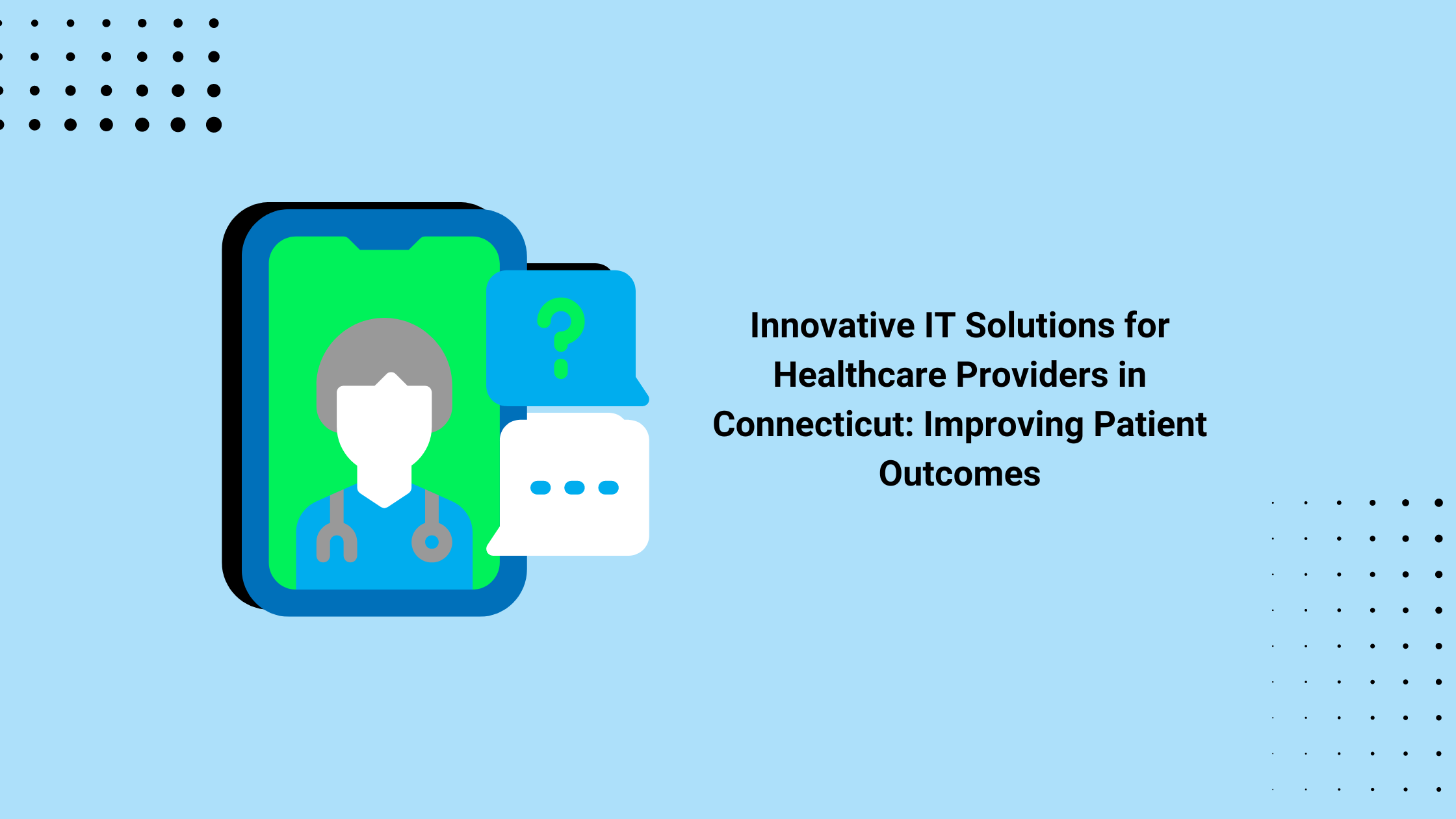
Introduction: The Role of IT in Transforming Connecticut Healthcare
The healthcare field is constantly evolving, which is why technology has always been a driving force in enhancing patient care and operational efficiency. In Connecticut, healthcare providers are leveraging innovative IT solutions to not only streamline their workflows but also to improve patient outcomes across the board. From telemedicine platforms that expand access to care to data analytics tools that enable personalized treatment plans, IT is transforming how care is delivered, making it more effective, efficient, and patient-focused.
In this blog, we’ll explore the cutting-edge IT solutions that are contributing to better patient outcomes, as well as the why it’s important to enhance data security and compliance in healthcare IT. We will also break down local innovations, in terms of the IT solutions tailored to Connecticut healthcare providers, and what the future of IT there looks like.
The Evolving Needs of Connecticut Healthcare Providers
It appears that rising patient expectations and the ongoing need for regulatory compliance are pushing healthcare organizations in Connecticut to rethink their operations. At the same time, the need for data-driven decision-making and enhanced cybersecurity measures is more critical than ever though, especially with the surge in telehealth services and digital patient records.
To remain competitive and deliver quality care, providers must adopt flexible, scalable IT solutions that can meet their evolving needs. From integrating electronic health records (EHRs) to automating administrative tasks, technology plays a key role in improving efficiency and reducing costs.
Furthermore, solutions like artificial intelligence (AI) and predictive analytics allow healthcare organizations to anticipate patient needs, leading to more personalized and proactive care. As these demands grow, Connecticut healthcare providers must adapt their IT infrastructure to ensure they are equipped to handle the future of healthcare.
Cutting-Edge IT Solutions Improving Patient Outcomes
Fortunately, there is a range of cutting-edge IT solutions that are revolutionizing patient care and in turn, improving outcomes for patients.
One of the most transformative technologies is Electronic Health Record (EHR) Integration. EHR integration allows medical records to be seamlessly accessed and shared across various electronic systems, making critical patient data, such as medical history, treatment plans, and clinical data, available in one centralized location. This reduces the risk of errors, enables more coordinated care among providers, and ensures that patients receive timely and informed treatment. By aggregating this data, EHRs allow for more tracking of patient health, leading to better decision-making.
Another game-changing solution is the rise of telemedicine platforms, which significantly enhance healthcare accessibility. Telemedicine breaks down geographical barriers by allowing patients in remote or underserved areas to connect with healthcare providers through virtual consultations. This not only improves access to specialists but also reduces the need for travel, minimizing delays in receiving care. For patients with chronic conditions or mobility challenges, telemedicine offers consistent monitoring and timely interventions, helping to prevent complications and maintain overall health.
Lastly, artificial intelligence (AI)-driven diagnostics are making strides in improving patient care through innovations like remote patient monitoring. AI-powered systems can analyze patient data in real time, identifying patterns and detecting early signs of potential health issues. This allows for more proactive care, as healthcare providers can intervene before conditions worsen. AI is also being used to assist in diagnosing diseases, recommending treatments, and predicting patient outcomes, leading to faster and more accurate care.
Enhancing Data Security and Compliance in Healthcare IT
Healthcare organizations are highly susceptible to cyberattacks due to the sensitive nature of the data they handle. By implementing strong security measures, healthcare providers can better protect patient information and meet regulatory compliance requirements like HIPAA.
Some of these measures include:
-
Endpoint Encryption:
By scrambling information into unreadable code, endpoint encryption ensures that even if data is intercepted, it cannot be decrypted or misused without the proper key. This is particularly crucial for devices like laptops, smartphones, and tablets that are used to access patient records. -
Software Updates and Patch Management:
Unpatched software can be exploited by hackers to gain unauthorized access to patient data. By maintaining up-to-date software, healthcare providers close these security gaps and minimize the risk of breaches. -
External Vulnerability Scanning:
External vulnerability scans identify security gaps in networks, allowing IT teams to address these issues before they can be exploited by malicious users. This is essential in healthcare, where data breaches can have serious consequences. -
Security Awareness Training:
Through security awareness training, healthcare staff learn how to recognize phishing attempts, identify suspicious activity, and follow best practices for safeguarding patient information. -
Security Information and Event Management (SIEM):
SIEM solutions provide real-time analysis of security alerts generated by applications and network hardware. By monitoring network activity, SIEM can detect potential threats, allowing organizations to respond to incidents quickly before damage is done. -
Multi-Factor Authentication (MFA):
Relying solely on passwords for access control is no longer sufficient. Multi-factor authentication adds an additional layer of security by requiring users to verify their identity through a second method, such as a fingerprint scan or a code sent to their mobile device. This helps prevent unauthorized access to sensitive patient data. -
Managed Detection and Response (MDR):
MDR solutions combine advanced security technology with expert monitoring to detect and respond to potential threats in real time. MDR services can limit the impact of cyberattacks and prevent data loss. -
Dark Web Monitoring:
Healthcare organizations can utilize dark web monitoring services to track whether sensitive data, such as patient information or login credentials, has been compromised and made available on the dark web. Early detection allows providers to take swift action to mitigate the risk.
Navigating HIPAA Compliance and Cybersecurity Challenges
Navigating HIPAA compliance is, however, a critical challenge for healthcare organizations, as failure to meet these standards can result in severe penalties, including fines and audits. HIPAA's primary goal is to protect patient health information (PHI) by controlling and monitoring access to it. Healthcare providers must implement strict access controls, encryption, and auditing procedures to ensure that PHI remains confidential and secure.
In addition to HIPAA, healthcare providers must also deal with evolving cybersecurity threats. As attacks become more sophisticated, organizations must continuously adapt their security strategies to stay compliant and protect patient data.
Local Innovations: IT Solutions Tailored for Connecticut Healthcare Providers
From data privacy requirements to the need for telemedicine solutions, healthcare organizations in Connecticut require IT services that not only meet national standards but are also tailored to local needs. Charles IT’s approach begins with an understanding of state-specific compliance regulations, such as those from the Connecticut Department of Public Health (DPH) and state HIPAA guidelines. We then tailor our services to ensure that healthcare providers meet these compliance requirements while also optimizing operations through cutting-edge technologies.
Additionally, at Charles IT, we focus on enhancing patient outcomes through IT solutions that streamline workflows, improve the security of patient data, and support telehealth services. Whether it’s implementing endpoint security to protect medical devices or developing a secure, efficient network for telemedicine, Charles IT delivers solutions that allow Connecticut healthcare providers to focus on delivering exceptional patient care.
Conclusion: The Future of IT in Connecticut Healthcare
As the healthcare landscape continues to evolve, Connecticut providers will increasingly rely on advanced IT solutions to enhance patient care, streamline operations, and meet regulatory demands. By adopting innovative technologies and partnering with local experts like Charles IT, healthcare organizations can stay ahead of challenges and ensure they are well-equipped for the future. The right IT solutions not only improve efficiency but also help providers to deliver better outcomes for patients.
Contact Charles IT today to schedule a consultation and discover how we can help you drive better patient outcomes through advanced technology.




